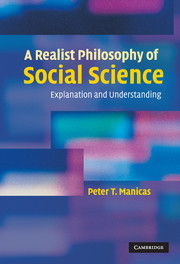Book contents
- Frontmatter
- Contents
- Acknowledgements
- Introduction
- 1 Explanation and understanding
- 2 Theory, experiment and the metaphysics of Laplace
- 3 Explanation and understanding in the social sciences
- 4 Agents and generative social mechanisms
- 5 Social science and history
- 6 Markets as social mechanisms
- Appendix A The limits of multiple regression
- Appendix B Comparison, Mill's methods and narrative
- Appendix C Rational choice theory and historical sociology
- Appendix D The neo-classical model
- References
- Index
2 - Theory, experiment and the metaphysics of Laplace
Published online by Cambridge University Press: 12 November 2009
- Frontmatter
- Contents
- Acknowledgements
- Introduction
- 1 Explanation and understanding
- 2 Theory, experiment and the metaphysics of Laplace
- 3 Explanation and understanding in the social sciences
- 4 Agents and generative social mechanisms
- 5 Social science and history
- 6 Markets as social mechanisms
- Appendix A The limits of multiple regression
- Appendix B Comparison, Mill's methods and narrative
- Appendix C Rational choice theory and historical sociology
- Appendix D The neo-classical model
- References
- Index
Summary
Introduction
Chapter 1 noted that understanding came when we had a well-confirmed theory about a generative mechanism. In this chapter we consider the essentials of construction and confirmation of theory, including the role of experiment in those sciences where experiment is possible. While the literature on theory is both vast and contentious, we can here be relatively brief. Our aim is to focus on what is absolutely essential for the purposes of a philosophy of the social sciences. More important for us is the effort in this chapter to undermine the bad metaphysics of what is too often taken for granted in talk about theory and the goals of science. A key theme will be to show that celestial mechanics is a very poor example for the sciences, social and physical.
What a theory is
Despite much talk to the contrary, no real theory in the physical sciences can be fully expressed as a deductive system, with axioms and deductions therefrom. The idea has a long legacy dating at least from Descartes, from Newton's great work, and from the still older idea that mathematics is the ideal of knowledge (Harré, 1970: 8). As Harré says:
In fact, in actual science, deductive systems are quite rare: fragments of such systems can be found in physics, but mostly scientists come up with descriptions of structures, attributions of powers and laws of change, related by having a common object, not being then and there deducible from a common set of axioms.
(Harré, 1970: 10)- Type
- Chapter
- Information
- A Realist Philosophy of Social ScienceExplanation and Understanding, pp. 26 - 41Publisher: Cambridge University PressPrint publication year: 2006

